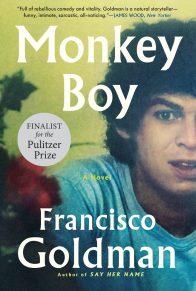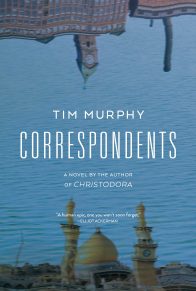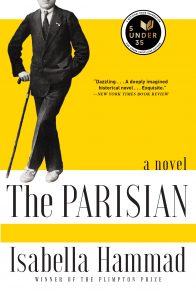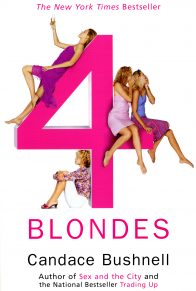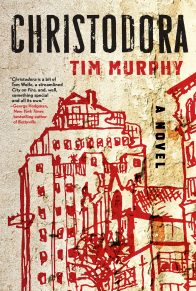“Confidently flips through time . . . [An] emotionally resonant, time-hopping page turner . . . Explores immigration, the effects of U.S. intervention, and the long arc of war.”—Huffington Post
“An American journalist of Irish-Lebanese descent finds herself in Iraq, covering the 2003 U.S.-led invasion and befriended by her Iraqi interpreter . . . An exploration of family, identity, and the price of war.”—Newsday
“Tim Murphy is a great writer, but what catapults him to excellence is his ability to immerse readers in hard moments in history . . . What makes this novel so good is the characters—the complexity of their lives and familial obligations, the empathy they evoke, the mistakes that they make and the positions they hold—as well as the author’s deftly human portrayal of the Iraq War. Correspondents is proof that the best novels are as important and insightful as nonfiction.”—Omnivoracious, the Amazon Book Review
“An honest, unflinching look at family and friendships and how those two things can and do survive even the darkest and most difficult of times. This is definitely one for fans of Khaled Hosseini and Claire Messud.”—Register-Herald
“An absorbing and candid behind-the-scenes journey into the life of a foreign correspondent . . . [A book] that will cross your mind regularly long after you close the cover.”—Historical Novel Society
“Love and war connect characters in the U.S. and Middle East in this family saga from Murphy . . . [A] finely tuned, well-researched novel . . . Murphy traces echoes across cultures, how each character is more of a mixture of heritages than simplified media coverage shows . . . The novel is infused with the complexities of Arabic language and culture; well-turned depictions of life in Baghdad, Damascus, and Beirut; and scenes capturing the anxiety and drudgery of war reporting . . . For all its wealth of detail, the novel is propulsive and engrossing and rooted in the simplest of storytelling points: Empathy can erase prejudice . . . Fresh, affecting . . . A surprisingly moving war novel alert to global violence and politics but thriving on the character level.”—Kirkus Reviews (starred review)
“A multigenerational saga that insists upon the potential, even the necessity, of cross-cultural relationships while highlighting their challenges . . . Murphy is himself of Irish-Levantine ancestry, and early chapters about Rita’s heritage swell with affectionate detail. But the geographic and cultural canvas of this work is much larger, and its message of empathy and respect for cultural nuance aims at an audience as big as America itself.”—Booklist (starred review)
“Murphy draws his characters with warmth and compassion, emphasizing their deep love for family . . . The geopolitical dramas of the early 2000s and the actions in the Middle East by American leaders make the book even more relevant to present-day realities. But the novel’s true strength is its cast of vivid, flawed, deeply human characters who struggle and make mistakes, and do their best to work for good in uncertain, even dangerous, times.”—Shelf Awareness
“Ambitious . . . Unlike most Iraq war novels, this work delves deeply into the lives of Iraqi civilians and the toll the invasion has taken on their families, their careers, and society at large. It also provides an interesting look into the high-pressure world of journalism.”—Library Journal
Praise for Christodora:
Longlisted for the 2017 Andrew Carnegie Medal for Excellence in Fiction
Named a Best Book of the Year by the Guardian
An Indie Next Selection
An Amazon Editors’ Top 100 Best Books of the Year
A Publishers Weekly Big Indie Book of Fall 2016
“A powerful novel about the AIDS crisis and its legacy . . . Hugely ambitious . . . [A] rich, complicated story . . . No book has made me feel so intensely not just the ravages of AIDS but also the devastating cost of activism . . . Christodora recounts a crucial chapter in the history of queer life, which is to say in the history of American life. It’s also, for all the despair it documents, a book about hope.”—Garth Greenwell, Washington Post
“[A] thrillingly accomplished novel . . . [The] varied minds and voices are realized so convincingly that Christodora sometimes seems the product of spirit possession. And it is joyous despite its subject matter . . . Murphy’s skills are most nakedly on display as he describes the addictions in which Mateo and others find solace, and their electrical-shocking, soul-warping, mind-annihilating trips . . . Desperately intense, it is the kind of scene that requires putting a book down for a moment to take a breather.”—New York Times Book Review
“A rich and complicated New York saga . . . An exciting read . . . Christodora has the scope of other New York epics, such as Bonfire of the Vanities, The Goldfinch and City on Fire . . . Capacious yet streamlined, it is a very fine book.”—Newsday
“An ambitious, time-traveling novel textured with the detail and depth of a writer who spent years reporting from the front.”—New York
“In the East Village, the Christodora has long symbolized gentrification, luring well-heeled professionals (and celebrities like Iggy Pop, Julia Stiles and Vincent D’Onofrio) to a once-gritty neighborhood that was a hotbed of boundary-pushing art and transgressive lifestyles. The building’s totemic power is a driving force in Christodora . . . A sprawling social novel in the Tom Wolfe tradition.”—New York Times
“[I] fell hard for Tim Murphy’s Christodora . . . A sprawling account of New York lives under the long shadow of AIDS, it deals beautifully with the drugs that save us and the drugs that don’t.”—Guardian (Best Books of 2016)
“[An] ambitious novel . . . Powerful and compelling. It feels deeply relevant even when it covers events set several decades in the past . . . This is a novel that abounds with ambition, but it largely succeeds in grappling with a host of grand themes.”—Minneapolis Star Tribune
“Epic in scope, [Christodora] cannily grapples with many of the seminal touchstones of contemporary New York City life . . . Murphy is a gifted writer . . . For those invested in HIV/AIDS, and the ongoing response, Christodora is a must read. It is the work of fiction many within the movement have been waiting for . . . What emerges is imagination and experience refracting onto the page. It is a beautiful—and often painful—sight to behold.”—Lambda Literary
“[A] perceptive debut novel . . . Murphy vividly recaptures 1980s and ’90s New York, dampening any pop-culture nostalgia with reminders of the crude pharmacology and callous bureaucracy imposed upon those struggling with AIDS . . . His multigenerational tale is a clever inversion of the usual addiction-begets-AIDs narrative . . . It never wavers in its warmth toward its characters, or its insistence upon the possibility of healing.”—Booklist (starred review)
“Tim Murphy’s book is a masterful and panoramic story of New York City and the East Village from the 1980s to the present.”—Ira Sachs
“Christodora tells a compelling story of family, friendship, love, and loss that spans decades, but manages to fully immerse you in an important and difficult time in downtown Manhattan . . . [An] outstanding book.”—Cary Fukunaga
“An impassioned, big-hearted, and ultimately hopeful chronicle of a changing New York that authoritatively evokes the despair and panic in the city at the height of the plague.”—Hanya Yanagihara, author of A Little Life
“A moving portrait of New York in the time of AIDS, Tim Murphy’s honest and insightful writing gives Christodora a particular vibrancy that causes the characters to leap, whole, into the reader’s imagination. This spectacular novel is an important addition to literature that captures New York in all its glory and despair.”—Candace Bushnell
“An intimate portrait of a bohemian family, Christodora is also a capacious historical novel that vividly recreates the lost world of downtown Manhattan in the eighties—a nuanced portrait of an era in which artists were unwitting agents of gentrification and the bright dawn of gay liberation was brutally interrupted by the AIDS epidemic.”—Jay McInerney
“An exuberant, ambitious, funny, gorgeously written epic, Tim Murphy’s Christodora not only makes us privy to the most intimate secrets and dreams of a group of unforgettable diverse characters, this brilliant tale also sweeps us up into the spirit of our age, from the AIDS crisis to now and even into the future, so that we can see and feel the devastating effects of time as it changes us forever.”—James Hannaham, author of Delicious Foods
“Every once in a while a writer truly gets this town with its buffet of hipsters, crazy characters, and endearing troublemakers. Christodora is a bit of Tom Wolfe, a streamlined City on Fire, and, well, something special and all its own. Tim Murphy—smart, perceptive, and streetwise—is an author with a dazzling eye and ear who delivers a real New York narrative with an absorbing storyline and a gallery of characters fit for a twenty-first century Manhattan mural. It came, I sat, I read and read. I emerged completely satisfied.”—George Hodgman, New York Times bestselling author of Bettyville
“Murphy dives into the story of one of the East Village’s most storied buildings—and returns with a moving novel, a love letter to the complicated families we make here in New York, and to the city itself.”—Alexander Chee, author of The Queen of the Night








